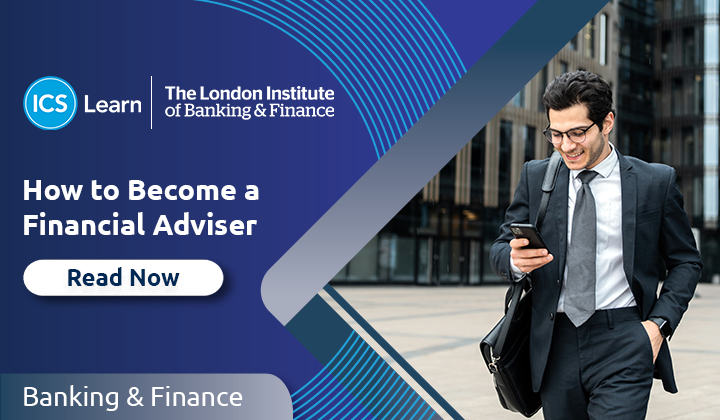Working as a financial adviser is often a lucrative career path, however, it’s not a one-size-fits-all model of working.
From shifting economic circumstances to ever changing targets and legislations, financial advisers become invested in their clients’ financial lives and help them build a roadmap for their ongoing financial endeavours.
So, whether you want to help people manage their finances or advise them on how to approach their retirement planning, in this blog we take a closer look at how to become a financial adviser.

What does a Financial Adviser do?
Being a financial adviser is all about guiding people towards a secure financial future and providing peace of mind. Financial advisers help individuals and businesses to take control of their financial wellbeing.
They build long-lasting client relationships, creating bespoke plans to help their clients realise and achieve their aspirations. Essentially, financial advisers help their clients refine and stay on-track with both their short and long-term financial goals, by offering advice that can be utilised over time.
A Financial Advisor’s main role is to offer personalised financial guidance to people in all kinds of situations. With a large range of products to choose from, they help clients select the financial planning and investment solutions that’s right for them.
The type of financial advice they give can cover a lot of different areas – from protection, loans, insurance, retirement planning, investment choices and management, right through to tax and estate planning.
Typical daily duties for a Financial Advisor include:
- Meeting with clients to discuss their current financial situation, and future financial goals
- Analysing client circumstances and producing detailed reports of their situation.
- Undertaking risk analysis
- Deciding which service offered most effectively helps the client to achieve these goals
- Explaining the features and benefits of each option with clients to help inform their decision
- Analysing the market and producing financial reports
- Regularly contacting clients to update them about their investments
- Abiding by the regulatory aspect of the role, such as the requirements for disclosure, the advised products and the costs of the services that have been provided

How to Become a Financial Adviser
1) Evaluate your existing skills
If you are considering a career in financial advice, you should firstly reflect on the skills you currently have, evaluating how far they are compatible with those of the role specifications.
There are certain skills that are necessary for a successful career in financial advice, with perhaps the most important being excellent communication, interpersonal and listening skills.
Some of the other essential skills expected from financial advisers include:
- Being able to explain complex information in a simple, clear and concise manner
- Strong research and analytical skills
- Good time management, self-motivation and organisation skills
- Customer service skills
- The ability to network and establish healthy and positive relationships with clients
- A good level of numeracy and IT skills
- Having a target-driven mindset and a flexible approach to work
- Showing discretion and an understanding for the need of client confidentiality
- Displaying an ethical and professional approach to work
- Having good negotiating and influencing skills as well as determination and tenacity
If you find yourself to be prominent in the majority of the above skills, then you already have a strong foundation to build towards your financial adviser career.
2) Become certified to enhance your industry knowledge
Once you have identified the skills, the next step is to establish and showcase your expert knowledge and applied skills through gaining a highly-sought after industry qualification.
More specifically, the Diploma for Financial Advisers (DipFA), offered by the London Institute of Banking & Finance (LIBF), is a great place to start!
Financial advice is regulated by the Financial Conduct Authority (FCA), which requires all advisers who want to provide advice in the UK must attain a relevant professional qualification before they can do so.
Considered an industry benchmark, the Diploma for Financial Advisers meets the Financial Conduct Authority’s (FCA) qualification requirement for retail investment advisers and is designed to equip you with the knowledge and skills required to offer financial advice.
The diploma covers 6 modules:
- Module 1: Financial Services Regulation and Ethics (FRSE)
- Module 2: Advanced Financial Advice – Taxation (AFAT)
- Module 3: Advanced Financial Advice – Investment (AFAI)
- Module 4: Advanced Financial Advice – Protection (AFAP)
- Module 5: Advanced Financial Advice – Retirement Planning (AFAR)
- Module 6: Advanced Financial Advice – Coursework (AFAC)
Each of the modules above is individually assessed, and must each be completed to gain the diploma. Upon completion of the qualification, you’ll be entitled to become a Member of the London Institute of Banking & Finance (MLIBF), as well as gain access to LIBF’s Continuing Professional Development (CPD) services.
If that’s not enough, we are proud to launch our new partnership with The London Institute of Banking and Finance (LIBF) and bring you the new LIBF Digital Academy powered by ICS Learn.
Offering the DipFA 100% online, this innovative virtual learning platform offers learners the opportunity to study the Diploma for Financial Advisers (DipFA) remotely and at their own pace along with access to a variety of built-in benefits, including:
- Paperless learning
- Multi-device access
- Engaging and easy to absorb content
- Live online and recorded webinars
- End-of-unit quizzes, and
- Dedicated tutor support
Download Your Free LIBF Course Guide
Get information on our LIBF courses
Share this post
3) Consider your career path options
Industry qualifications are a great way to enhance your knowledge and develop practical skills that can undoubtedly boost your career, but nothing can top the knowledge and skills gained through work experience. In other words, work experience is the perfect way to put the skills and knowledge you've developed during your qualification into practice.
If you want to find work experience as a financial adviser, however, it’s important to understand that there are two known types of financial advisers: independent and restricted.
Independent advisers, also known as Independent Financial Advisers (IFAs), tend to research and consider a wide range of the investment products and providers available that meet their clients’ needs. They are obligated to offer unbiased and unrestricted advice, with some even offering advice on mortgages. Restricted advisers, on the other hand, can only offer limited advice, focusing on particular products and providers.
Keep in mind that the role of ‘Financial Adviser’ can encompass a variety of other jobs or specialise in specific products, sometimes referred to as wealth manager, financial representative and investment adviser.
Alternatively, you can launch your financial adviser career with a paid internship, or in a junior position, to gain practical experience before starting to move up the career ladder to seek senior positions.

4) Prioritise your professional development
Gaining an industry qualification is more than enough to help gain and solidify all the knowledge and skills you will require in your career.
This could not be further from the truth. Despite how many qualifications you have successfully gained, there’s still so much out there for you to learn from a practical perspective.
As mentioned, the financial advice industry constantly faces reform, with professionals constantly needing to upskill and stay on-top of current and emerging industry trends. However, how are you meant to stay on-top of your game in the fast-paced world of work?
Engaging with podcasts, for example, is perhaps one of the most effective ways to do so. There are so many out there for you to choose from, but these are just some of our personal favourites:
- Financial Adviser Success: brings real success stories and insights from the most successful financial advisers
- The Adviser Lab by CION: this podcast reflects on the changing landscape of financial advice and how advisers can find new ways to gain and retain clients
- Modern Financial Adviser: a podcasts by Truelytics, it explores topics related to transition management and business optimisation for the wealth management and insurance industries
- Financial Adviser Marketing: this podcast focuses on helping financial advisers attract their ideal audiences, forge authentic relationships and build deep roots with prospective clients.
If podcasts aren’t your thing, there are tons of other resources to look into as well as numerous annual networking events and seminars offered by LIBF, which are dedicated to continuing professional development (CPD).
We’re lucky enough to live in an era where an abundance of information is always readily available to us for free, just a few clicks away. Why not take advantage of it?
All things considered, a combination of industry standard training, paired with cultivating the essential skills mentioned and a desire to help people are key to becoming a successful financial adviser.
Kickstart your career as a financial adviser with a 100% online DipFA course. Enrol today and watch your career take off.
4 Tips for Saving for Your First Home
Saving for your first home can be an exciting but daunting experience. We've pulled together 4 of our best top tips to help kick-start your savings journey.
How to Become a Financial Adviser
Working as a financial adviser is often a fruitful career path, however, it’s not a one-size-fits-all model of working. In this blog we dive into how you can become a financial adviser.
5 Best Career Development Tools for Financial Advisors
Looking to develop your career in financial advising? Here are our top 5 choices of the best career development tools that are available for financial advisors.

















